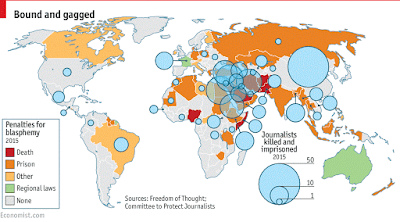
31 July 2016
Muzzled Mouthes ~ Free Speech Under Siege...
The Economist spotlights The muzzle grows tighter on the scourge of anti-liberty cultural, religious, and legal muzzling of free speech. Vile governments, religious wingnuts of all flavors, authoritarian or conservative movements -- all evil and spreading... 

23 July 2016
Volcanic Climate Change ~ Sulfate Evidence...
OpenMind shares 1816, the Year Without a Summer when...

"It snowed and froze in parts of Europe and North America. Crops were ruined, triggering the worst famine of the nineteenth century [and] became known as “the year without a summer,” a climatic anomaly that affected the northern hemisphere"We now know this is at least partly due to the massive Tambora volcanic eruption.
"Evidence of the long range of the emissions from Tambora has been found in the high sulphur content in samples of polar ice from the time, says paleoclimatologist Robert Mulvaney of the British Antarctic Survey [...] “Very large eruptions (such as Tambora) can lift material very high in the atmosphere, and into the stratosphere,” explains Mulvaney. “Once in the stratosphere, the sulfur dioxide can oxidise into sulphuric acid, which is taken up by tiny water droplets to form a haze in the stratosphere that can reflect incident sunlight back away from the Earth, causing less light to penetrate through the atmosphere, and the Earth to cool.” This sulphuric acid circulating in the stratosphere is then detected in ice cores. In this way, scientists can estimate the volume of emissions from an eruption."Here's the evidence showing it's happened at huge scale at least a couple times per century, so inquiring minds want to know "when's next"?

History of Coups ~ Visualizations of Attempts...
WaPo's Adam Taylor shares dataset about political coups since the 1950s compiled by political scientists Jonathan Powell and Clayton Thyne. By "coup" they mean illegal and overt attempts by the military or other elites within the state apparatus to unseat the sitting executive...


"Why did they have the first one? Coups also generally occur in disproportionately poor countries that suffer from other forms of political instability (such as protests and/or civil war). In recent years, there seems to be an increasing proportion of coups in new democracies, especially those that seem to already be backsliding toward authoritarianism. Ultimately, the legitimacy of the government is a crucial indicator."


15 July 2016
Origin of Crops ~ Worldmap of Agrisourcing
Cool site with interactive and related worldmaps on Origin of Crops... 

04 July 2016
Independence Day ~ US Declaration of Secession
Thanks to FEE's David D'Amato for reminding us that July 4th...
"Independence Day, presents an opportunity to reflect upon the principles immortalized in the Declaration -- principles that, if taken seriously, hold the seeds of sweeping political transformation. The declaration is not only radically libertarian, but radically decentralist."
 |
Subscribe to:
Posts (Atom)





